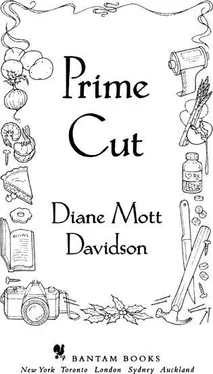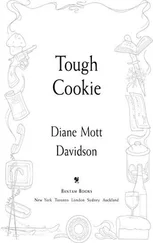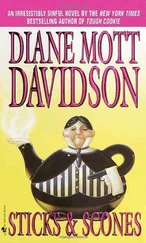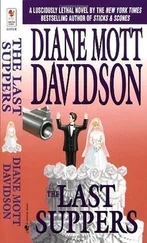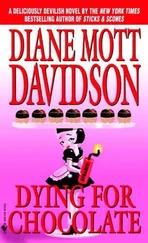Only Tom had managed to outsmart the marauders. With great care, he’d lofted nets over our Montmorency cherry trees and tied the nets to the trunks. While awaiting his captain’s call the previous night, Tom had patiently salvaged the last of the scarlet fruit. Through the back window, I watched the elk quizzically appraise our trees. Nothing there, boys, time to move out .
I crossed to the counter, moved the faxed map showing the location of Eliot’s body, and surveyed with a sinking heart the clutter of glasses, plates, and measuring cups. Before Gerald Eliot had revved up his saw, he’d asked me to empty the cabinets on the left side of the window. Then he’d crashed through the window and the right-hand cabinet, and the contents of those shelves had ended up in smithereens.
The next day, Eliot had bounded up my front steps all smiles, sketchy plans for a new kitchen tucked under his arm. He’d claimed he could have my new kitchen done before the first snow. Ha . Although it was always difficult for me to believe that people could so heartlessly try to take advantage, I’d been forced to accept Tom’s assessment of constructor sabotage. I’d stonily told Eliot to fix the window; my husband would repair the cabinet. Now my remaining glasses teetered in stacks; the broken cabinet stood on its side in the hallway. How many other people had Eliot tried to cheat this way? And had any other clients wanted to strangle him the way I’d longed to?
I took a steadying breath of the sweet, fresh air pouring through gaps in the dusty plastic. With The Jerk and his violent nature temporarily locked up in jail, I had taken for granted the fact that we could finally relax with our windows open. Or rather, relax with our windows missing . I refilled my espresso machine with water, ground a handful of fragrant coffee beans, and rinsed Tom’s bowl of homegrown cherries.
As the water gushed over the fruit, my mind snapped back to the traumas of the last two days. What would happen to Cameron now? Had Cameron murdered Gerald Eliot? What could I do? Interfere and you’ll get Cameron, Tom, and yourself into more trouble , my inner voice warned.
I sharpened a knife, started pitting the cherries, then washed my hands and put in a call to Lutheran Hospital to check on Barbara Burr. I was told she could not be disturbed. Next I phoned the sheriff’s department to see if they could tell me anything about Cameron. Burr was being processed, I was told. Like liverwurst? I longed to ask.
I energetically mixed the pitted cherries with sugar and cornstarch. I loved the Burrs; both had been extraordinarily kind to Arch when he was eight and I was doing my docent work. Cameron, then president of the county historical society, could talk about Aspen Meadow’s history the way some people can croon show tunes. The times I’d had to take Arch with me to the museum, Cameron had kept my son spellbound with stories of local outlaws, ghosts, Indians, and untold, priceless treasure buried in Aspen Meadow. Arch had been rapt. I hadn’t been immune either.
I laid the fruit in a buttered pan and thought back to the photos on the Burrs’ guest house walls: Cameron and Barbara with shovels and maps. In the thirties, Cameron had told Arch, Aspen Meadow and Blue Spruce had been aswarm with treasure hunters. A persistent Depression-era rumor held that a stagecoach robber had buried a coffee can chockful of gold pieces in a mine shaft in Aspen Meadow or Blue Spruce. Forget that there was no mining in Aspen Meadow or Blue Spruce; Arch had subsequently insisted we follow a trail that—legend had it—led to the gold at the top of Smythe Peak. We’d dug for hours, to no avail, and our only company had been Steller’s jays squawking at us for invading their domain.
I beat butter with sugar for the cobbler topping, and recalled Arch’s wide-eyed plea that we visit a local ranch where longhorn steer were raised. There, contrary to recorded history but according to Cameron Burr, Jesse James and his gang had buried fifty thousand dollars at the foot of a lodgepole pine. The trick was finding the right tree. Jesse James himself had supposedly pointed a knife downward to the treasure, and embedded the weapon in the pine tree’s trunk. If he had, both the knife and the fifty thousand were still there, because Arch hadn’t found them.
I measured flour with baking powder, remembering the time Cameron and Barbara had accompanied us on one of the many treasure hunts Cameron had sparked in my too-imaginative son. The Burrs, Arch, and I had crawled through the crumbling Swiss-built inn west of Aspen Meadow where the Bund —Nazis and their sympathizers, posing as bicycling tourists, the story went—had allegedly met during the Second World War. The inn, empty for years and recently renovated as apartments, had given us permission to search the place while the construction crew worked on new plumbing. Alas, to Arch’s intense disappointment, we’d uncovered no stash of deutsche marken below swastikas carved—by squatters? Or by frustrated treasure seekers?—on closet floors.
Now, at fourteen, Arch didn’t drag me out on treasure hunts anymore. Instead, he listened to pounding rock music, worried intensely about his appearance, and yearned for Julian to move back. And though he would never admit it, the only thing Arch truly wanted was a girlfriend .
I stirred egg into the cobbler dough and dropped spoonfuls of the thick, golden batter on top of the glistening cherries. No treasure, no girlfriend, and the Burrs in deep trouble. Gerald Eliot dead. And I needed catering business. I slid the cobbler into the oven and contemplated my booking calendar.
This was Tuesday, August nineteenth. Unfortunately, my slimy catering competitor, Craig Litchfield, had so severely cut into my bookings that I had no work until a week from today. And even more unfortunately, that work was unpaid. Tuesday, the twenty-sixth of August, was the date of the rescheduled tasting party at the Homestead. This time, the catering competition for the Merciful Migrations September Soiree would be silent. I would be up against André and Craig Litchfield. The Soirée committee included my frequent catering clients Edna Hardcastle and Weezie Harrington, as well as Marla. How had the committee arrived at the decision that they even needed to put the event out for bids? I had no idea.
I loved André. I would enjoy working by his side even if he won the competition. Still, I was sure Craig Litchfield had somehow forced the issue of a contest. What I couldn’t imagine—and what was troubling me—was the means he would employ to try to win it.
I made another espresso, wished I had one of Julian Teller’s indescribably flaky, bittersweet-chocolate filled croissants to go with it, then stared glumly at my calendar. The day after the tasting party was Wednesday, the twenty-seventh of August. That night, I would be doing a birthday dinner party for twenty for Weezie Harrington. Wealthy widows and divorcees always worry that no one will remember their birthdays, so they often give a party for themselves. Weezie was no exception, although she’d had a friend issue the invitations.
I moved my finger across the calendar. My next booking after Weezie’s party was Saturday, August thirtieth. That day, Edna Hardcastle’s daughter Isabel would finally, finally be married, and I would cater the twice-postponed reception. But two booked events and one tasting party would not be enough. With Tom suspended, and no money coming in, I had to find more work.
I put in a call to André’s condominium and got the caregiver for Andre’s wife, Pru. Pru’s handicap made her extremely shy. I had only met her once, as she disliked going out or having people over. Dealing with Pru’s condition, plus the cost of her maintenance, had contributed to Andre’s concerns after his retirement.
Читать дальше
